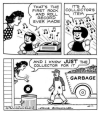With a Spring in his step
Laon
| moon-lit Surry Hills
| 12/09/2002
(4 out of 5 stars)
"As everyone knows, the great mystery of the 20th century wasn't "Who shot JFK", or even "What really happened at Roswell?"* It was this: "How come at the beginning of the twentieth century Wagner was conducted fast while Bach was slow, but by the end of the 20th century it had worked the other way round?"You can blame aliens, the Mob, Cuban refugees or the communists, but here at Conspiracy Central we know the true culprits. First, general (rightful) reverence for the conductors Furtwängler and Knappertsbusch, whose Wagner was notoriously slow - though they still made things move when the drama required it. Despite their own greatness, their influence on a generation or two of imitators who thought slow had to mean deep (Reginald Goodall, for example) was mostly malign. Second, cultural shift: the Victorians and their early twentieth century successors thought of Bach as essentially religious music, even the secular pieces, so that listening to Bach was as virtuous as attending church. We're now less inclined to take Bach's apparent Lutheran pieties at face value, while Wagner's more complex spirituality becomes accepted as part of the Sacred. So while Bach performance moved from the ritualised to the dramatic, Wagner performance headed in the opposite direction. But there's an alternative twentieth century tradition of Wagner conducting, which stayed closer to the fast-moving pace set by Wagner himself in his own works, and by conductors close to Wagner. Two giants in this brisker tradition are Toscanini and the under-rated (and sadly under-recorded) Alfred Coates. Another is Leinsdorf. To get a feel for Leinsdorf's approach to _Walküre_, and its merits, it's only necessary to begin at the beginning, and listen to what Leinsdorf makes of the Act I prelude. I used to wonder, hearing other versions of this music (Furtwängler, Karajan, Solti, Böhm), why Wagner's earliest critics were so excited by that opening weather report. I heard only a passage with little melodic interest and no very convincing evocation of a storm. In the bass strings we had perhaps an echo of Siegmund grimly plodding through some bad weather, but that was about it. But in the Leinsdorf version Wagner's music suddenly made sense. It was like a fuzzy image coming into focus, revealing a crisp, clear picture. At Leinsdorf's speed you really do feel and hear the buffeting wind and something of Siegmund's danger and desperation. Play it and the temperature in your room will drop. Leinsdorf's speed and vividness pay off in other places: for example Brünnhilde and Wotan's lighthearted exchange at the opening of Act II, before Fricka sets the tragedy in motion, and in big moments such as the Walkürenritt and Wotan's farewell. The other great strength of this set is the cast. The advantages of Hans Hotter's Wotan over George London's are well known: Hotter was the greater vocal actor, and makes you feel Wotan's dilemma and pain like no one else in this role. But there's another side: compare Hotter's and London's "Nun zäume dein Ross" at the beginning of Act II. Hotter is stretched beyond endurance; the voice seems big but ungainly, insecure both of note and of rhythm. By contrast George London takes the passage in his stride, with focussed, strong and handsome singing. He may not have Hotter's insight in the long monologue, but where the role calls first and foremost for firm and beautiful singing (as in Wotan's final passages in Act III) London comes into his own. The young Jon Vickers gives us one of the best Siegmunds since Melchior. I prefer Vickers' performance on this set, at the beginning of his career, to his later performance for Karajan. In that set the problem wasn't Vickers but Karajan, who adopts a leaden pace for the impossibly romantic music where Siegmund promises Sieglinde that he will Take Her Away From All This. In Leinsdorf this music, like the twins themselves, is properly passionate. Vickers' partner Gre Brouwenstijn is at the end of her career, but still an ardent and youthful-sounding Sieglinde. This set also introduced Birgit Nilsson, with her first complete recording of the _Walküre_ Brünnhilde. Flagstad's golden tone has never been replaced, but Nilsson's steely strength is the next best thing. Nilsson was better for Solti, but in Leinsdorf she gets to sing her glorious Act III music with George London almost equally glorious in reply, which gives the advantage to Leinsdorf. Of the remaining cast David Ward is an adequate Hunding and Rita Gorr an adequate Fricka, but no more. On the other hand Leinsdorf's Walküren make a great flight team. So why only four stars? I've praised Leinsdorf's brisk approach, but it does have a cost. In some moments where the music should linger, where tenderness of phrasing is called for, Leinsdorf throws the musical line away. Try the Act I orchestral interlude, where Siegmund stares into the fire before bursting out with "Ein Schwert verhiesst mir". Leinsdorf is merely efficient here, where he needs to be magical. The plaintive working and reworking of Sieglinde's and related themes, the startling appearance of the sword motif, all these things simply pass by, too quickly to make the proper impact. There is no perfect _Walküre_ recording. My own solution is to play the legendary Bruno Walter Act I with Melchior, followed by Solti's Act II, and finally Leinsdorf's Act III. So while this is not the perfect _Walküre_ either, it has some unique strengths, in Leinsdorf, London, Vickers and Nilsson, that place it among the best. Cheers!Laon(* The answers to the less important 20th century mysteries? "Probably just Lee Harvey Oswald", and "Impressive commercial exploitation of an urban myth".)"
Wagner, Vickers, Ward :: Die Walkure















